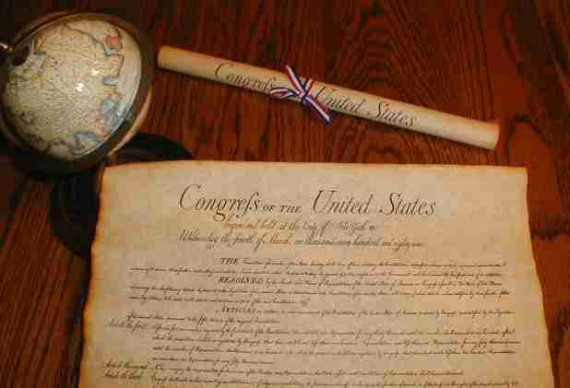Laws That Forbid Americans From Joining In Boycotts Violate The First Amendment
Arguments advanced by those advocating a bill that would prevent Americans from participating in a boycott of Israel would not violate the First Amendment appear to be without merit.
In a piece in today’s Washington Post arguing in favor of a bill before Congress that would expand current American laws barring Americans from taking part in boycotts by international organizations such as the Arab League, which called for boycotts of Israel as long ago as 1977, against companies doing business in Israel to include international organizations like the United Nations or European Union, Jonathan A. Greenblatt and Stuart Eizenstat attempt to push back against the argument that such legislation would be a violation of the First Amendment:
In criticizing the pending anti-boycott legislation, the ACLU and other opponents ignore the four-decade track record of the 1977 law. They have not cited a single instance in which “political beliefs” have led to civil or criminal penalties under current law. Courts have repeatedly upheld the 1977 act against constitutional challenges on free-speech grounds as a legitimate restriction on commercial conduct.
To be clear, criticism of Israel, its treatment of Palestinians and its settlement policies are indeed protected by the First Amendment as free speech. The Israel Anti-Boycott Act does not target the rights of U.S. individuals and companies to criticize Israel, which — like any country — is subject to criticism for its policies.
What companies and individuals would not be able to do under this legislation, however, is boycott Israel at the behest of international governmental organizations, just as they are now prohibited from doing at the behest of Arab nations. Congress has wide constitutional authority to limit such discriminatory international commercial conduct that lawmakers find contrary to U.S. national interests.
This argument is meant to counter the argument that civil liberties advocates and the organizations they represent have made that barring an American citizen from taking part in a boycott, regardless of the reason, would clearly be a violation of the First Amendment and therefore unconstitutional. One of the primary arguments in that regard was advanced by the American Civil Liberties Union in a post on its website earlier this summer:
On its face, the bill appears to directly prohibit boycott activity that is protected under the First Amendment. Even if the bill could be interpreted more narrowly, as some of its supporters claim, its broad language could still chill protected expression by scaring people into self-censorship. Either way, the bill would impose serious First Amendment harms.
Some people have argued that the bill effectively accomplishes nothing, because no international governmental organization is currently engaged in a boycott against Israel. But, as noted above, the bill’s statement of policy expressly opposes the UNHRC’s March 2016 resolution calling for a database of companies operating in the occupied Palestinian territories, and it declares that Congress views “such policies as actions to boycott, divest from, or sanction Israel.”
Reading the bill in light of its own statement of policy, a reasonable person could plausibly infer that the UNHRC’s March 2016 resolution amounts to a “request” for a boycott within the meaning of the bill. That would mean that anyone who attempts to support the resolution, as Congress has described it, by refusing to purchase goods made in Israel or the occupied Palestinian territories would be violating the law. Given the severe penalties at stake, many people would undoubtedly choose to refrain rather than risk prosecution.
But even apart from limiting the right to boycott by refusing to purchase goods for political reasons, the bill infringes on pure speech. It prohibits even requests for information about whether a person is doing business in Israel in order to support a boycott of Israel, regardless of whether the requester is actually engaged in a boycott. This additional prohibition will chill people from seeking information about companies boycotting Israel or engaged in business dealings in Israel.
For example, suppose a consumer wishes to make a decision about whether to purchase a product made by a certain company. She posts a request on Facebook seeking information about that company’s environmental, labor rights, or human rights record. Her request is protected speech. But if the company she is asking about operates in the occupied Palestinian territories, and she is asking about that activity in order to support the U.N.’s resolution and then publicly shares any information she receives, she would have reason to fear prosecution under the law.
All of this concerns, of course, the so-called Boycott, Divest, and Sanctions Movement, or “BDS” for short, which seeks to persuade other nations, international organizations, and corporations to stop doing business with Israel until Israel “meets its obligations under international law.” In recent years, the movement has become more controversial due to both its tactics and the rhetoric that it uses, which many have claimed has become increasingly anti-Semitic and anti-Israel, and many states have adopted their own version of laws prohibiting government entities, corporations, and individuals from taking part in or advocating in favor of the boycott that the BDS movement is seeking to promote. As a matter of policy, I am not taking any position with regard to the BDS movement itself or the assessments regarding its rhetoric. As a matter of law, though, it seems clear to me that the argument that laws that seek to make participation in the boycott illegal are permissible are especially problematic.
Eugene Volokh and Eugene Kontrovich, both of whom post at The Volokh Conspiracy on First Amendment issues, have written posts openly rebutting the ACLU’s arguments. Given the fact that both men are far better versed on this subject than I am, I have given their arguments considerable weight. Additionally, as Kontrovich points out, the 1977 law has been upheld against First Amendment challenges in the past, although it has been some time since such a case has been heard by any Court. In the end, though, it strikes me that the ACLU and the opponents of the proposed law have the better argument and that the proposed legislation as well as, perhaps, the entire underlying law itself, are or should be found to be unconstitutional.
In making their arguments in favor of the anti-boycott legislation, people such as Greenblatt, Eizenstat, Volokh, and Kontrovich argue in part that the law is aimed not at those who advocate for a boycott, but only at those who seek to participate or engage in the boycott itself. This strikes me as being a distinction without a difference given the fact that the Supreme Court has held on several occasions that conduct is as much protected as actual speech under the First Amendment. As far back as 1931, the Court ruled in Stromberg v. California that a California law barring the display of red flags in public was unconstitutional, ruling that peaceful conduct that was not disruptive of public order was “repugnant” to the Constitution. In 1945, the Court ruled in West Virginia State Board of Education v. Barnette, that the First Amendment protected the rights of students who refused to take part in the recitation of the Pledge of Allegiance. In ruling in that case, Justice Robert Jackson noted that the very purpose of the Bill of Rights was to remove certain subjects, such as freedom of speech from “the vicissitudes of political controversy, to place them beyond the reach of majorities and officials and to establish them as legal principles to be applied by the courts.” Some twenty-four years later, in Tinker v. Des Moines Independent Community School District, the Court ruled that a school district could not bar students from wearing black arm bands to school to protest the Vietnam War, a ruling that vastly expanded the understanding of the First Amendment rights of students. Two years after that, the Court ruled in Cohen v. California that a defendant could not be punished for wearing a jacket that said “Fuck the Draft” in a public place, saying that the act the law was aimed at punished “speech” rather than “conduct.” In 1989, the Court ruled in Texas v. Johnson that laws criminalizing burning the American flag were an unconstitutional abridgment of the First Amendment and that the burning of the flag constituted expressive conduct that was clearly within the boundaries of the First Amendment. More recently, the Court held in Snyder v. Phelps that the Westboro Baptist Church could not be punished for holding protests on public property outside the funerals of American soldiers who had died in Iraq or Afghanistan.
In each of these cases and others, the Supreme Court has made clear that, while there is generally a distinction under First Amendment law between speech and conduct, there are circumstances when conduct clearly falls within the category of expressive speech that was entitled to protection under the First Amendment. Just as these cases concerned conduct as much as they did actual speech, participating in a boycott, or arguing in favor of others to do so, is arguably a form of speech protected by the First Amendment that is deserving of the same respect as something that someone says in public, in the written form, or electronically. In fact, politically motivated boycotts are a long tradition in American politics on both sides of the political aisle. A law that bars them in this instance is arguably as impermissible as one that would bar participation in a boycott of the fast food outlet Chik-Fil-A due to the fact that its owners have donated to causes opposed to marriage equality or LGBT rights. The fact that the subject matter of these boycotts is the State of Israel rather than a political cause is, in the end, immaterial.
As I noted above, I express no opinion about the BDS movement itself or the legitimacy of its positions. Rather, I am arguing that the laws that prohibit Americans and American corporations from participating in the boycott that the movement calls for is, and should be found to be, unconstitutional. If the legal system is called on to rule on this issue and my argument ends up on the losing side, I’ll accept that argument and move on. Based on existing precedent and the Supreme Court’s rulings on the First Amendment in recent years, I believe my position is correct and that the bill currently pending in Congress would be found unconstitutional to be correct.







I must admit that I feel a little stupid here. How does anybody know if I’m boycotting anything, when the ‘act’ of boycotting is more like not doing anything?
In other words, I’m currently not doing any business with Israel. I just need to know if I’m going to be arrested for boycotting them.
Aside from what seems to me to be an impossible burden of proof, this proposal is blatantly unconstitutional.
This bill also got sent to death by committee months ago, so I suspect that Messrs. Greenblatt and Eiszenstat are actually trying to generate some momentum behind something that is otherwise destined to die.
@Franklin:
Well, if you made a public statement indicating you were motivated to boycott based on the BDS Movement, then there would arguably be a case.
Beyond that, though, you are correct.
Almost makes you think that getting people to out themselves by making public statements is the whole point, doesn’t it?
Can’t you pretty much engage with businesses in other countries as you choose? Irregardless of First Amendment problems, wouldn’t there be other issues with anti-boycott laws?
From the description above, it would seem that merely requesting information on whether a company does business with Israeli West Bank companies is a crime under the law. Or do I misunderstand?
In any case, Israeli marches farther and farther down the Apartheid road. It takes away land from people in the illegally occupied territories and gives it to religious fanatics, then uses the Israeli army to kill those who protest. And the Palestinians are corrupt thugs that have used generations of terrorists to kill innocents. No one on the Israeli side has been sincerely committed to a peace process since an Israeli religious fanatic put a bullet in Rabin twenty-two years ago. The Palestinian side has never given any indication they are serious about a realistic peace plan. It’s time we washed our hands of this mess. Reagan and the Republicans protected and coddled South Africa’s Apartheid regime for as long as they could, but eventually the exposure provided by modern media was too much to make it worth continuing to sully America’s name. The same thing will eventually happen with Israel and in this case there is no “right” side. We should wash our hands of the whole business sooner rather than later.
To me the implication of forbidding commercial discrimination based on the company/owners conscience is that the bakers who refused the LBGT cake have no leg to stand on.
@Argon:
Absent something like a sanctions law passed by Congress, the answer to your general question is yes.
@RWB:
I don’t believe they do, but that will have to await a decision by SCOTUS
Don’t you think this is aimed at big money targets such as public pension funds and the boards, shareholder blocs and CEOs of major corporations?
Of course, that doesn’t overcome the Constitution, but it does show the long historical acknowledgement of mob action.
My memories of the current anti-boycott law is that companies are prohibited from agreeing to contract terms that they not do business with Israel, nor are that permitted to answer questions regarding their earlier business dealings with Israel from contract partners trying to enforce the Arab anti-Israel boycott.
@JKB: good point and well presented. I would just note that the boycott movement is mostly concerned with Israeli companies that make their goods in the illegally occupied territories. Not in Israel proper. It would seem to me (and many others, I suspect) that by making it illegal to boycott such companies the US will be overturning decades of precedent and endorsing the occupation.
Wow, more of the tail wagging the dog…it would be nice if someday the leaders of the United States set the terms of the relationship with Israel that would benefit our country before theirs…
If the Supreme Court has ruled that money = speech, then surely the withholding of money also equals speech, yes?